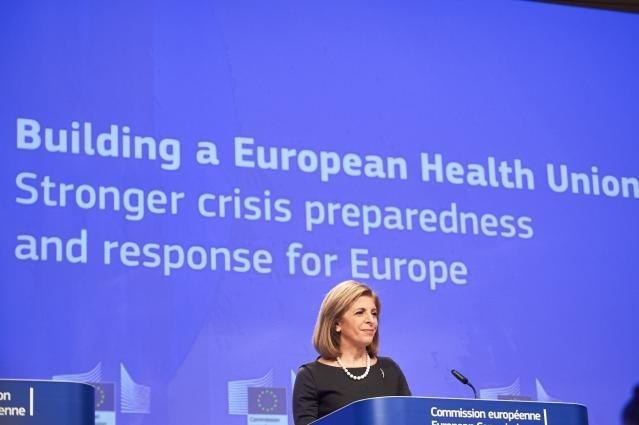The European Commission announced yesterday that the College has adopted a proposal to strengthen the EU's health security framework and to reinforce the crisis preparedness and response role of key EU agencies. The proposal builds on lessons learned from the current crisis but comes too late for containing the second wave of the coronavirus.
The proposal, in the form of a Communication and a new regulation on tackling serious cross-border health threats, was described by the Commission as the start or the first step of building a European Health Union to increase EU’s preparedness and coordinate more proactively the response on EU level to future health crises.
Stella Kyriakides, Commissioner for Health and Food Safety, admitted at yesterday’s virtual press briefing that the EU was taken by surprise during the first weeks of the outbreak of the crisis and that its response was largely uncoordinated, mainly because the member states are responsible for managing public health crises at national level.
Since then it has become increasingly clear to all that no country can tackle a cross-border public health crisis on its own.
“Health is more than ever an essential concern for our citizens,” she said. “In times of crisis, citizens rightfully expect the EU to take a more active role. Today we are reinforcing the foundations for a more secure, better-prepared and more resilient EU in the area of health. This will be a significant change for the capacity to respond collectively.”
In the discussions leading up to the proposal, the Commission did not exclude Treaty change to give the Commission more power to coordinate measures against a pandemic but the proposal does not require any such changes.
Roger Casale, CEO of citizen rights NGO New Europeans and a former Labour MP, welcomed the proposal and added that Treaty change is not necessary at this stage.
“The Commission has clearly listened to the voice of citizens as well as experts and has taken on board many of our detailed recommendations including for the setting up of a European Health Union. The key now is to engage the public in the reconfiguration of healthcare in Europe.”
A source in the Commission confirmed that the proposed measures fully respect the responsibilities of the member states for their public health policy and for the organisation and delivery of health services and medical care. “We do not need Treaty change for what we are proposing.” Kyriakides was convinced that the member states will accept more coordination on EU-level.
“We have come a long way in understanding what we can do together when we are acting in solidarity,” she explained and referred among others to the joint procurement of medical equipment and vaccines. The announcement of the proposal coincided with the Commission’s autorisation yesterday of a contract with a fourth vaccine producer.
Ensuring doses of vaccines in sufficient numbers to all member states is probably the best example of EU coordination but leaves the decision on how to distribute them to risk and priority groups in the hands of each country. The European Centre for Disease Prevention and Control (ECDC) wrote in October that an EU-wide approach on COVID-19 vaccination will be crucial.
Once vaccines have been proven to be safe and effective and have been granted market authorisation by the European Medicines Agency (EMA), they need to be distributed and deployed across Europe. The Commission will ensure that all countries will receive the vaccines on a pro-rata basis but member states need to be prepared for the deployment of the vaccines and develop national vaccine strategies.
Among the main measures in the proposal is the reinforcement of the two EU agencies, ECDC and EMA, and the Commission itself (DG Sante) with more specialist staff to ensure that they will have the necessary capacity to meet the needs in times of a pandemic. Indirectly, the Commission admits that they were poorly prepared for the outbreak.
Commissioner Kyriakides disclosed yesterday that more than €600 million during next budget period (2021 – 2127) will be ear-marked to the recruitment of staff to the agencies and DG Sante. This could be quite a long process and will be useful for future health crises. “Regarding the staffing at the agencies, we cannot give you a definitive timeline at this early stage,” the Commission commented.
The total budget in the Commission proposal for EU4Health was reduced from €9.4 billion to €1.7 billion by the Special European Council in July. The Commission has not provided further details on the overall funding of its proposal but the European Parliament is expected to vote today (12 November) on a tripling of the proposed funding for EU4Health to €5.1 billion.
The new regulation will enable the EU to adopt common measures to face future cross-border health threats and to declare an EU-level public health emergency at the advice of an Advisory Committee of independent experts. The recognition of such a situation will enable the introduction of measures related to medical products, to monitor shortages of such products and to procure and deploy them.
M. Apelblat
The Brussels Times

